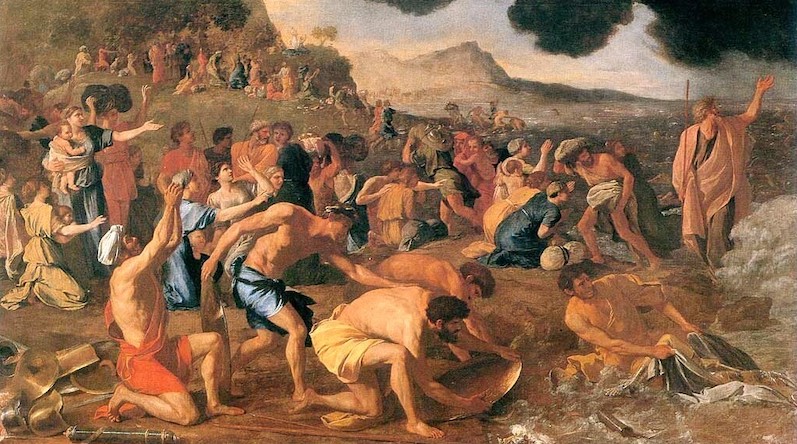Lectio Divina: A Meditation on Scripture
With the Sacred Scriptures as its principal source-text, each Lectio Divina (“Sacred Reading”) essay offers a prayerful meditation on the Word of God—one which draws from the wealth of biblical literature, as well as the prayer life of the individual author.
Scripture is often sweet. I am consoled every time I hear in Psalm 81, “Oh, that my people would hear me, that Israel would walk in my ways! At once I would subdue their foes, turn my hand against their enemies.” Whatever I am suffering, I am reminded that God desires my salvation more than I do. He has promised to help us at the very moment we call upon him.
For a vivid example of God’s saving hand, consider the Israelites trapped between the Red Sea and the pursuing Egyptian forces. God parted the Red Sea, and the Israelites passed through the dry river bed while the pursuing Egyptians drowned after them. By dividing the waters of the sea, God did not just save the Israelites. He coddled them. According to a popular Easter hymn they even crossed with feet “unmoistened.” God not only saved Israel when they trusted in his power, but he saved the Israelites from even the discomfort of getting their feet wet.
Yet there is a slight problem here: how often is this actually the case? It certainly doesn’t seem to accurately describe my own life. When I have followed and trusted in the Lord, my problems did not go away instantly. In fact, following the Lord often leads to new trials. When Moses and Aaron, according to the command of God, began to demand freedom from Pharaoh, the Israelites were told both to continue the same work and to gather their own materials to make bricks. It is not always the case that following the Lord causes hardship, but it is naive to claim that following the Lord makes all things simpler in every way.
How can this be? Is Psalm 81 false? Will God not help us at once? Is God really helping us when we surrender to him if following the Lord so often involves trials?
What if God assists us precisely by afflicting us? This is the response of Fr. Bonaventure Perquin, O.P., who says that “Our trials are very often the way [God] chooses to teach us to practise the virtues we have been praying for” (Abba Father, 63). Difficulties do not imply that God has abandoned us. Rather, our afflictions point to the success of our prayers as they are the first step to attaining true happiness. We are not far from the eighth beatitude, “Blessed are those who are persecuted for the sake of righteousness, for theirs is the kingdom of heaven” (Matt 5:10).
We can understand this better if we think about how God has made us. According to one of the first church fathers, Saint Irenaeus of Lyons, God gave us free will “so that those who had yielded obedience might justly possess what is good, given indeed by God, but preserved by themselves” (Against Heresies IV.37.1). God deliberately chose to make us incomplete so that we would have to struggle and learn to depend on him to attain our own completion. God did not make us perfect robots that would follow his every will. Neither did he make us with the expectation that we would throw up our hands, abandon our reason, and let him do everything. Instead, God teaches us through trials and sufferings to help us preserve what he has given to us.
The process of learning gives us an example of how trials are necessary. When I taught philosophy a few years ago, I was often conflicted while teaching. I just wanted to tell my students the truth and what to think. They trusted me and would have believed me. Yet, I ultimately did not want them just to accept the truth. I wanted them to fight and struggle for the truth so that it became theirs. I came to understand that a good teacher must at times be at peace with letting his students flounder. Only the student who has confronted the world in its perplexity can be said to have learned, and only the Christian who has been afflicted can be said to have learned to love (see Job 5:18).
Therefore, the words of the Psalmist remain true. If we follow the Lord, he will indeed begin to subdue our foes at once. Surrendering to God is of prime importance, and God desires to bless us according to the depth of our surrender. Yet God is a master teacher whose blessings and lessons, at least at first, often look like curses and feel like punishments. We would do well to heed the advice of Ben Sira: “If you come forward to serve the Lord, prepare yourself for trial” (Sir 2:1).
✠
Image: Nicolas Poussin, The Crossing of the Red Sea (public domain)







